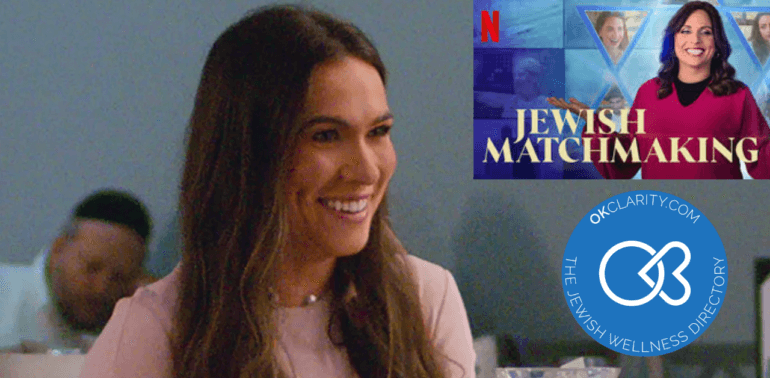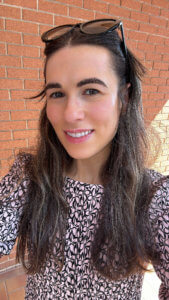
Jewish Matchmaking Star Increases Mental Health Support in Jewish Community
You may have first met Fay Brezel on Jewish Matchmaking, the hit Netflix series where she quietly broke stereotypes by showing up as her full, authentic self: a proud Orthodox Jewish woman deeply rooted in Torah values and passionate about mental health and personal growth.
But long before Netflix, Fay was building something even more impactful—OKclarity.com, the leading online mental health platform for the global Jewish community, co-founded with her mother to help Jews find culturally aligned therapists, coaches, and wellness experts.
In honor of Mental Health Awareness Month, Fay reflects on her journey, the lessons she’s learned about healing and holiness, and why mental health in the Jewish world is a sacred, lifelong pursuit.

Jew in the City (JITC): You had a rare platform to represent an observant Jewish woman to a global audience on Jewish Matchmaking. What did it mean to you to show that someone can be both deeply committed to Torah and invested in mental health and personal growth?
Fay Brezel (FB): Honestly, it was just a chance for me to be myself. But I also knew that just by showing up authentically, I was representing something that’s not often seen: a grounded, healthy, observant Jewish woman. Jews in the media are usually portrayed in one extreme or another. This was an opportunity to offer a more accurate and relatable view. You can be deeply committed to Torah and fully engaged in personal growth, mental health, business, and everything else. In fact, it’s often the values and structure of Torah that give you the grounding to thrive in all those areas.
JITC: Can you share what inspired you to start OKclarity.com with your mother — especially as proud, observant Jewish women?
FB: Yes — it really started from a shared passion between me and my mom. She’s a therapist, and I became one too. In my early years seeing clients, I kept noticing a pattern. So many people in the Jewish world were struggling in similar ways, and there wasn’t an online space that reflected their experience or helped them feel less alone.
We originally launched OKclarity.com as a private forum to connect people navigating mental health challenges. But as we grew, I realized the model wasn’t sustainable. At the same time, I was transitioning from the clinic to start my own private practice and saw firsthand how hard it was to get found by the right clients. Aside from Psychologytoday.com there was nothing out there built for our world. That’s when the lightbulb went off.
We transformed OKclarity.com into what it is today — the global directory platform where the Jewish world can find trusted, culturally aligned mental health and wellness professionals. Therapists, psychiatrists, coaches, nutritionists, holistic healers — all in one place.
JITC: What’s the story behind the name “OKclarity”? What does clarity mean to both of you personally and professionally?
FB: The “OK” part reflects something we strongly believe in — that it’s okay to be just okay. Most of life is lived in the messy middle. This part of the name honors the people who are in that process. It takes the pressure off needing to feel amazing or terrible. It says, “You’re OK, you’re on your way, and that’s more than enough.”
“Clarity” is another foundational concept for us. There’s a well-known Jewish teaching: “Ein simcha ke’tarat hasfeikot” — “there is no joy like the resolution of doubt.” That’s clarity. We’re all searching for it in one way or another. While certainty isn’t always possible, clarity often is. And that clarity can be life-changing.
Together, OKclarity represents the space we wanted to create — where people in the Jewish world could feel held during the journey, and supported in finding the clarity they need to move forward.
JITC: OKclarity.com focuses on helping the Jewish community specifically. Why is culturally sensitive care — especially care that understands Torah values and Jewish life — so important?
FB: Our lives are filled with nuance. There are so many layers — from Torah values to halachic practice to community norms — and when those things show up in therapy or any healing work, it can be exhausting to have to explain them. You could spend an entire session, or three, just providing the education. And even then, the provider might still miss the context. That shared language, both literal and cultural, makes a huge difference.
This was always part of our mission at OKclarity.com. But after October 7, it became even more urgent. We saw a massive surge in people looking to leave therapists who didn’t understand the Jewish experience or, in some cases, who held views that made clients feel unsafe. OKclarity.com became a safe haven for them.
JITC: You’ve built a platform connecting people with therapists, coaches, and wellness experts. What makes finding culturally aligned care so challenging, and how does OKclarity.com make that process easier?
FB: What’s unique about OKclarity.com is that we honor the full range of what culturally aligned can mean. Some people want a provider from their exact background, and others prefer someone outside their community but who still understands it deeply. We get it and we built for it. That level of nuance is hard to find, and it’s something we’ve been intentional about from day one.
And if you’re not sure where to start, we offer a free “Match Me” service. It’s like having a personal shopper — but for your emotional and mental health.
JITC: How do you see Jewish tradition offering tools for mental and emotional resilience? Are there values or practices from Torah life that support mental health in ways people might not realize?
FB: Absolutely. I’m a big believer in full-spectrum healing, and leaving out spirituality is one of the biggest mistakes people make. Without it, I don’t think true, lasting healing is possible.
The Torah is full of tools for emotional resilience. It gives us guidelines not only for how to live, but how to live with meaning, stability, and joy. A huge part of that is emunah and bitachon — belief and reliance on God. The Torah doesn’t tell us to suffer alone. It tells us that God puts helpers and healers in the world for a reason, and that it’s our responsibility to reach out to them.
There’s a classic story about a man who prayed every day to win the lottery. After 120 years, he goes up to heaven and asks God why his prayer was never answered. God responds, “You never bought a ticket.” We all want breakthroughs in our lives — in our emotional health, our relationships, our personal growth — but part of faith is showing up and doing our part: Buying the ticket.
JITC: How do you hope OKclarity.com is changing the narrative around Orthodox Jews and mental health — both within our own community and in the broader public eye?
FB: I believe it already is. Over the past few years, we’ve seen a massive shift. People are more open to therapy, to coaching, to the full spectrum of healing. They’re less ashamed to get help, less secretive about their struggles. We hear from users every day who found life-changing support through OKclarity.com — people who wouldn’t have felt safe asking around, who were too embarrassed to go the traditional referral route, or who had bad experiences elsewhere. They found a professional on our site, and everything changed.
But here’s the thing — my mission was never to “fight the stigma.” My goal wasn’t to push back against what’s broken. It was to raise the bar and show a better path. And that’s what OKclarity.com is doing. It’s shifting the culture — not just in the Orthodox world, but across the global Jewish community. And, potentially, for the world at large.
JITC: As we mark Mental Health Awareness Month, what’s one takeaway or piece of advice you’d like to leave with our readers — especially those in Torah-observant communities?
FB: There’s so much I could say, but if I had to choose one message, it would be this: choosing a Torah life is choosing a healing journey.
I believe most of us — if not all — are gilgulim, souls who came into this world to repair something. That means we’re meant to struggle. Being a Torah Jew means being in tune with that. It means asking, “Where am I being stretched? Where am I being called to expand? How am I working on overcoming the challenge?”
At the same time, Hashem has placed us in a generation with more knowledge, support and resources than ever before. The question is whether we’re willing to take the next right step. That might look different for each person — a therapist, a coach, a spiritual mentor, a chavruta, a shiur, a daily walk in nature, a dance class, or a few minutes of journaling. Being kind to yourself, taking actionto become happier and healthier — it’s part of what Hashem wants from us.
My advice is this: recognize that your job in this world is to be on a healing journey — and learn how to make peace with that process. You’re not meant to fight your struggle. You’re meant to partner with it. When you build the right support around you, when you have healthy skills that translate into a healthy lifestyle – even the most challenging days can include moments of calm, joy, acceptance and a deeper connection to Hashem..
That’s the real avodah. And it’s a path worth walking.
To learn more about OKclarity.com, visit their website here.
If you found this content meaningful and want to help further our mission through our Keter, Makom, and Tikun branches, please consider becoming a Change Maker today.







